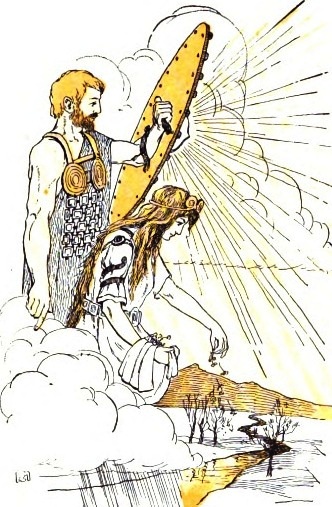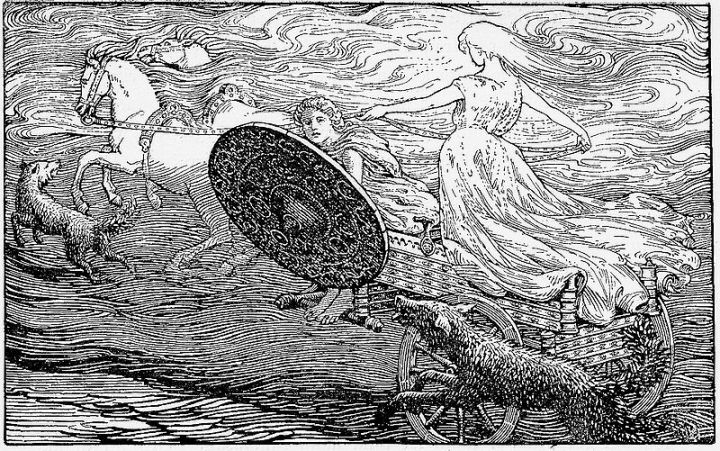The Poetic Edda: A Study Guide
The Speech of the Masked One

[PREVIOUS][MAIN][NEXT]
[HOME]
MS No. 2365 4to [R]
AM 748 I 4to [A]
Normalized Text:
Svalin heitir,
hann stendr sólu fyrir,
skjöldr, skínanda goði;
björg ok brim
ek veit at brenna skulu,
ef hann fellr í frá.
Svavl (Svöl) heitir,
hann stendr sólu fyrir,
skjöldr, skínanda gvði;
björg ok brim
ek veit at brenna skulu,
ef hann fellr í frá.
38. Svalinn heitir,
hann stendr sólu fyrir,
skjöldr, skínanda goði;
björg ok brim
ek veit at brenna skulu,
ef hann fellr í frá.
in Icelandic Poetry
“The Song of Grimnir”
Works, p. 140 (footnote)
XXXVIII.
Presented to the blazing skies,
The argent shield, Sualiner[1]
lies:
Nature would its doom receive,
Were it once the heavens to leave.
[1]
SUALINER, the solar shield or fabulous refrigerator of the world.
There is an account of this shield in
the thirty-eighth stanza of Grimnismal.
"Svalin is his name, he stands a shield before the sun, the shining deity. I know that the hills and the sea would burn, if it were to fall from its place."
The Yale Magazine, Vol. 16
“The Song of Grimner”
in Edda Sæmundar Hinns Frôða
“The Lay of Grimnir”
Svalinus standeth a shield before
the sun,
Before his fiery glances; full well I know
That if it fall, the rocks, and e'en the sea,
The briny flood, shall burn with roaring flames.
[The form of the name
Svalinus confirms that the source for this translation was
Edda Saemundar hinns Fróda: Edda rhythmica seu antiquior, vulgo
Saemundina Dicta, 1787, which provided a Latin
translation of the original poem.]
38. Svalin the shield is called,
which stands before the sun,
the refulgent deity:
rocks and ocean must, I ween,
be burnt,
fell it from its place.
in Corpus Poeticum Boreale
“The Sayings of the Hooded One”
in Edda Saemundar
“The Sayings of Grimnir”
38. There is one called the Cooler who stands 'fore the Sun,
a shield from the shining goddess :
the mountains I ween, and the stormy sea
will flame if he fall from thence.
in The Poetic Edda
“Grimnismol: The Ballad of Grimnir”
in The Poetic Edda
“The Lay of Grimnir”
38. In front of the sun does Svalin stand,
The shield for the shining god;
Mountains and sea would be set in flames
If it fell from before the sun.
39. Svalin[1]
is hight, the Sun before,
a shield from the shining god,
Would smoke and smolder both sea and land,
if from him it ever should fall.
[1]
"Cooling."
in The Elder Edda
“The Lay of Grimnir”
in The Poetic Edda
“Grimnir’s Sayings”
The Cooler he is called who covers the Sun
Like a shield, shining for gods:
Fire would consume fell and ocean
Should his shield fall.
38. Svalin is the name of a shield which stands before the
sun,
before the shining god;
mountain and sea I know would burn up
if it fell away from in front.
The Elder Edda: A Book of Viking Lore
'The Lay of Grimnir"
in The Poetic Edda, Vol. III: Mythological Poems
“The Lay of Grimnir”
38. ‘Chill is the name of what stands in front of Sun,
a shield before the shining god;
mountains and oceans I know should burn
if it fell from in front.
he stands before the sun,
a shield for the shining goddess.
Mountain and main
I know must burn,
if he falls off.
[HOME][GRÍMNISMÁL]
 |
 |
 |
COMMENTARY
Svalinn is alluded to in Sigrdrífumál 15 (see previous stanza), and may also be referred to in a complex kenning for Thor found in Thorsdrapa 4, which reads: frumseyrir fljóða vargs Fríðar himintörgu "the prime diminisher of the maidens of the enemy of the goddess of the heavenly shield". Himintarga means "heavenly shield". Fríður "the beautiful one", is used as the name of a goddess in several kennings, and originally may have been an epithet of Freyja, [cp. Fjölsvinnsmál 38, where Fríð is one of Menglöd-Freyja's handmaidens.] Fríður himintörgu, thus is "the goddess of the heavenly-shield" (i.e. Svalinn, the sun-shield) or Sól, the sun-goddess. Her "enemy" (vargur) is the wolf which chases her across the heavens. The fljóð "maidens" of the wolf are giantesses. Their frumseyrir "prime diminisher" is Thor, the foremost slayer of giant maidens.

The second half of the stanza states that "mountains and oceans, I know should burn, if it fell from in front," (björg ok brim /ek veit at brenna skulu,/ ef hann fellr í frá.) During Ragnarök, that is precisely what happens when Surt releases his destructive flames (surtaloga) over creation: the mountains and the oceans burn. Since, the chariots of both sun and moon are thought to be wrought from sparks that flew up out of Surt's home, 'Muspel' or 'Muspelheim', according to Snorri, this stanza may be taken as an allusion to Ragnarök.

[PREVIOUS][MAIN][NEXT]
[HOME]